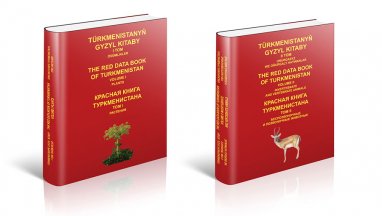
The exhibition of the Department of Nature and Local History of the State Museum of the State Cultural Center of Turkmenistan has been replenished with two volumes of the fourth edition of the Red Book of Turkmenistan, published in early June.
As reported in the Neutral Turkmenistan newspaper, now museum visitors will be able to see all issues of the publication, which can be called the result of the collective work, enthusiasm and creative efforts of biologists, specialists from various research institutions, educational institutions, and public organizations.
Currently, an addition to the excursion program is being prepared on two volumes of the book plants and animals.
As the source notes, the development of measures to protect rare and endangered species of plants and animals is carried out on the initiative of the International Union for Conservation of Nature (IUCN), created in 1948.
In 1978, the IUCN published the first international Red List.The first such publication in Turkmenistan appeared in 1985.The release of the second edition in 1999 made it possible to conduct a comparative analysis of fluctuations in the number of rare species of flora and fauna of Turkmenistan over the past 14 years.
The third edition appeared in 2011, in three languages (Turkmen, Russian and English), and again included new species of lichens and fern-like seedless plants.
In 2024, as a result of the painstaking work of biologists zoologists and botanists, ecologists, which lasted for several years, the fourth edition was published.
Researchers and guides from the Department of Nature and Local History of the State Museum conduct educational work to protect the flora and fauna of Turkmenistan, unique natural monuments and the country’s mineral resources. Their primary job is to constantly improve their knowledge and organize excursions at different levels for schoolchildren, students, adults and the elderly.
It has become a tradition to hold various competitions among young people. During school hours, visiting exhibitions are practiced in kindergartens, secondary schools, universities in the capital, and now, during the holidays, in children's health centers. A special emphasis is placed on endemic relict and endangered species that are under state protection.
